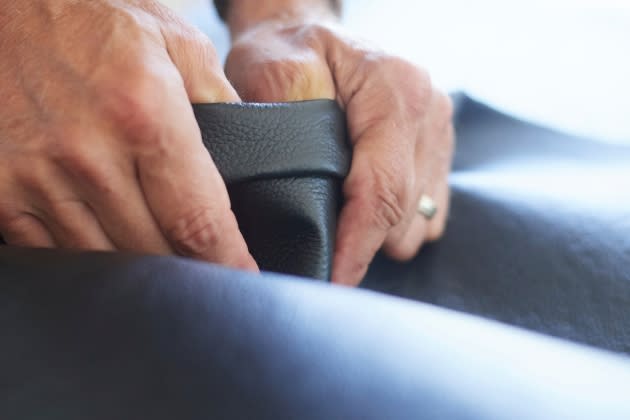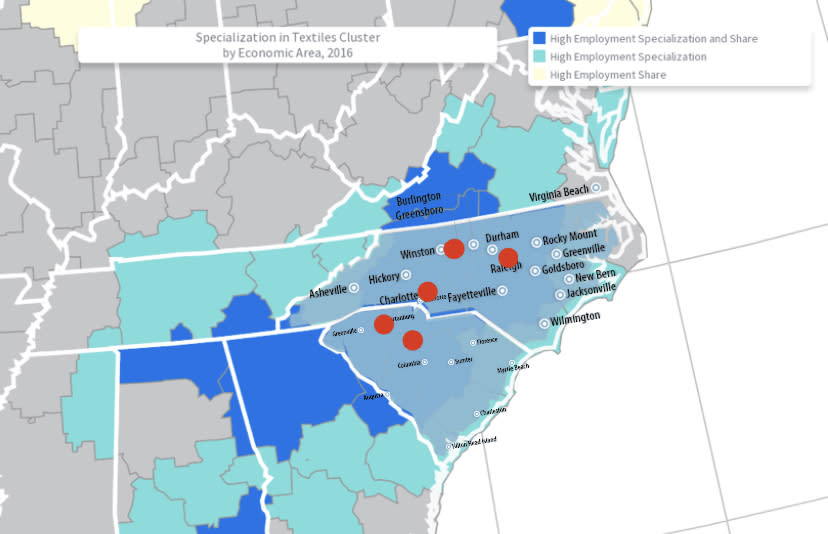What to Watch: Down South, Textile Towns Reinvent Themselves

It’s time to revisit the Carolinas.
What were once storied textile towns in the southern U.S. are now material makers, broadening upon bio-based materials for fashion and more. And with a growing cluster of ethical manufacturers down south, Carolinians can once again wear their maker status with pride.
More from WWD
“It’s an exciting time for our industry as companies like Walmart focus on bringing some of their supply chain back to the U.S. and the region,” said Eddie Ingle, chief executive officer of Unifi and maker of Repreve (a brand of recycled polyester). “In addition, new textile technologies are growing, like carbon fiber [used in everything from aerospace to clothing to sporting equipment] and nonwoven fabrics, which play a bigger role in the textile industry.”
Last year, 54 percent of the growing global fiber production was fossil-based synthetics with a near 61 million tonnes of polyester underpinning that growth (up from 57 million tonnes in 2020), according to Textile Exchange.
Fashion needs seismic shifts for lasting change. Globally, 37 percent of Unifi’s yarn sales were made from Repreve in fiscal-year 2022. “We have a publicly stated goal of growing this percentage to 50 percent by 2025,” reiterated Ingle.
More than two-thirds of Unifi’s global workforce resides in the U.S. (or more than 2,000 U.S. employees spread across three plant sites and the Greensboro, North Carolina, headquarters). Ingle said automation plays a huge role at Unifi, allowing for upskilling opportunities, improved quality of jobs and for competitive labor costs.
He added that many of Unifi’s customers are adding new knitting machines in the U.S. and Central America, as part of a reshoring effort made possible by the U.S. government’s “Yarn Forward” tariff rules (allowing importers to produce garments in Central America and ship them back to the U.S. duty-free).
Still, gaps exist. “The biggest opportunity we see is capturing the value of a garment at the end of life. This means that systems have to be set up to collect, sort and prepare garments for recycling, with the emphasis being on the initial design of the garment. A 100 percent polyester garment can be recycled easily, but unfortunately today, there is no infrastructure in place yet to extract the value of these great resources, but it’s coming,” Ingle said.
Asked what responsibility Unifi takes for propelling the polyester craze in a modern fashion landscape, Ingle said, “We take a very pragmatic approach to growing our polyester business and are not afraid to say that we believe polyester has actually impacted society in many positive ways. Polyester production has meant that more land can be used to grow food instead of cotton, which means less stress on water and fewer pesticides and less fertilizer being used.”

In Morrisville, North Carolina, just an hour outside of the state’s “Research Triangle” (getting its name from a neighboring park and three tier-one research universities: Duke University, North Carolina State University and University of North Carolina Chapel Hill), more is happening in terms of materials. Importantly, there’s a density of degrees in Morrisville. While the median household income is $61,972 in the state, per 2021 U.S. Census data, Morrisville boasts a median household income of $106,891.
The quest to divest from polyester continues with Keel Labs (formerly AlgiKnit). The material innovator’s flagship product “Kelsun” — a seaweed-based yarn with a significantly lower environmental footprint than conventional fibers — looks to be a solution for fashion’s waste problem.
Keel Labs cofounder and CEO Tessa Callaghan’s aspirations are for Keel Labs to be an incubator for the next generation of climate-focused solutions. “Our work begins with fiber, but our responsibility does not end there. We are building a future in which sustainable materials harness the power of our oceans to span industries and applications, repairing humanity’s relationship with our natural ecosystems,” she said.
Over in Union, South Carolina, another bio-based material competitor, MycoWorks, (popular for its mushroom-leather innovations and collaboration with the likes of Hermès), has residence. Its pilot plant for “Fine Mycelium” (the technology process behind the material) runs at a 10,000 tray capacity, while the full-scale plant will generate several million square feet of the material annually. The South Carolina plant will bring 400 jobs across roles in production, operations and engineering with a $107 million investment.
“The opportunity to invest in Union, South Carolina, enables us to bring high-quality jobs to the area, from biotech engineers to manufacturing experts and scientists,” said MycoWorks’ chief operating officer Doug Hardesty. “We’re told by local officials that our presence is a key part of their plan to improve the community’s quality of life for decades to come.”
In fact, Hardesty told WWD that the local high school is changing its curriculum to include in-depth studies on mycelium and how MycoWorks’ Fine Mycelium materials are manufactured. He said this welcome embrace by the community validates the new materials landscape. Elected officials also praised the facility’s sizable investment in the area and future ambitions.
Further Upstate (the historic South Carolina region that spans Spartanburg and Union Counties, among others), recycled material maker Evrnu’s new Spartanburg facility counts production capacity of 17,000 metric tons of pulp a year with the goal to include 100 percent NuCycl Lyocell fiber production and blend separation technologies over time. Altogether, the facility provides 60 jobs. Spartanburg is located between Charlotte, North Carolina and Atlanta.
“Leveraging local clothing waste and converting it into local fiber reduces impact to local communities,” Stacy Flynn, CEO and cofounder of Evrnu, told WWD. “The domestic textile industry was decimated by the 1990s and now we can help lead innovation and place it in areas around the world where we can innovate and modernize. We see this as a missing link; invention in textiles has not been a priority since the beginning of the Industrial Revolution and has historically been underfunded. Now that we see limits to growth due to natural resource depletion and the colossal amount of product waste enveloping us, it is the perfect time to act.”
In a popular LinkedIn post Eric Henry, president of North Carolina-based TS Designs, highlighted his pride in the ability to source an entire outfit from North Carolinian companies. (This feat wasn’t always the case, for reasons Evrnu’s Flynn outlined).
Beginning from the ground up, there are socks from Farm to Feet, made by Nester Hosiery LLC. Nester Hosiery is a performance sock manufacturing company located in Mount Airy, North Carolina. The company’s core competency is in manufacturing premium merino and synthetic goods. As for minimal footwear, there is Opie Way. Opie Way sources its vegetable-tanned leather and textile materials from U.S. manufacturers (many of which reside within 200 miles of Opie Way’s North Carolina factory). The brand’s styles start at $319 and the company also boasts a “Re-Sole” program for repairing its shoes.
One’s choice of apparel spans Solid State Clothing (for a T-shirt that is completely “dirt to shirt” in North Carolina) or for an active choice, Kitsbow Apparel’s “one piece” flow production for cycling and other sports. In 2021, Kitsbow sold off its remaining offshore-made clothes in pursuit of jobs Stateside. Its “Ride House” retail location is equipped with a visitor’s center, café, bike shop and changing rooms. As for bottoms, there is Raleigh Denim Workshop and Curatory for jeans (made with North Carolina-grown organic cotton). The facility is located in downtown Raleigh, steps away from a yoga and meditation studio and with a hipster café around the corner.
To top off a winter look, one can opt for a beanie that makes use of natural dye methods. Marigolds grown by Fonta Flora Brewery and dyed at the South’s last remaining garment dye facility (run by TS Designs) color a range of beanies.
“I have been saying for years, North Carolina is at the intersection of agriculture and apparel, now my outfit proves it,” reiterated Henry.

